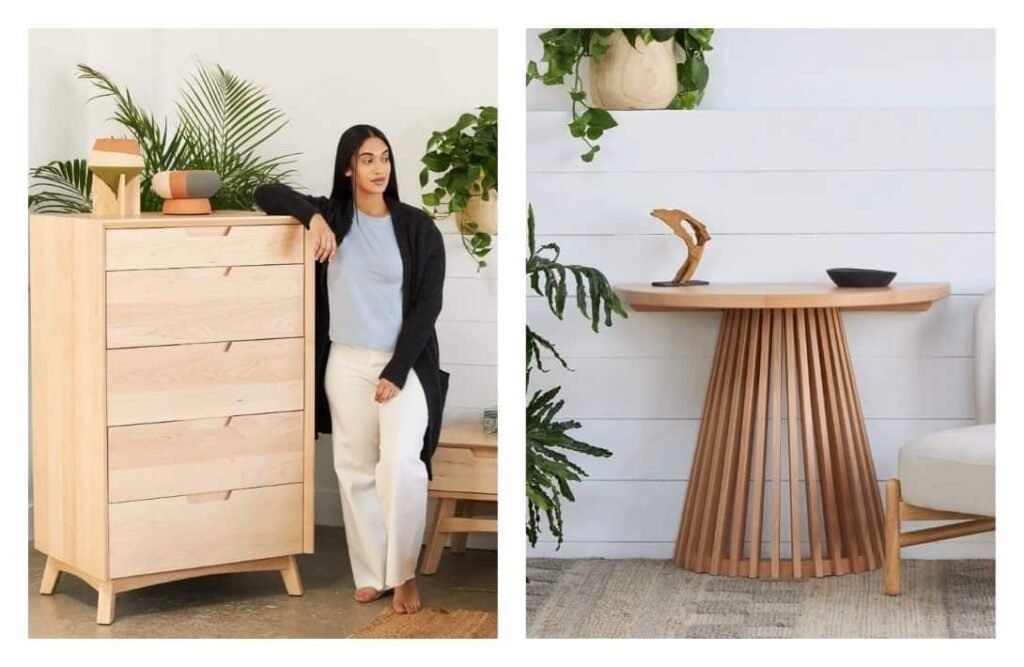Melbourne is renowned for its design-conscious culture, strongly emphasising sustainability and environmental responsibility. The city’s design community promotes eco-friendly practices, including creating and appreciating sustainable designer furniture.
Sustainable designer furniture in Melbourne is gaining popularity as homeowners seek elegant, eco-friendly pieces that enhance their living spaces and minimise their carbon footprint. This article delves into the concept of sustainable elegance and explores how eco-friendly practices shape the world of designer furniture.
Materials Matter: Choosing Eco-Friendly Components
One of the pillars of sustainable designer furniture is carefully selecting materials. Traditional furniture production often relies on materials like hardwoods sourced from deforested areas or non-recyclable metals and plastics. However, sustainable designers prioritise eco-friendly alternatives. Materials such as reclaimed wood, bamboo, recycled plastics, and organic fabrics are gaining popularity for their lower environmental impact.
Eco-Conscious Production Methods
Sustainable designer furniture goes beyond just using eco-friendly materials; it also focuses on environmentally responsible production methods. Manufacturers are adopting greener practices, such as reducing water consumption during production, using non-toxic adhesives and finishes, and implementing energy-efficient manufacturing processes. These eco-conscious approaches help minimise waste and decrease the carbon footprint of each piece.
Longevity and Timeless Designs
Sustainability is about creating furniture that stands the test of time in terms of design and durability. Sustainable designer furniture often features timeless aesthetics, ensuring the pieces remain relevant and stylish for years. By investing in high-quality materials and craftsmanship, these pieces can withstand wear and tear, reducing the need for frequent replacements and curbing excessive waste.
The Beauty of Upcycling
Upcycling is a creative, eco-friendly design approach that repurposes discarded materials or furniture into new, functional pieces. Designers often transform old wood pallets, industrial machinery, or vintage furniture into unique, striking designer pieces. Upcycled furniture adds a touch of character and history to a space while diverting waste from landfills.
Supporting Local Artisans and Fair Trade
Sustainable designer furniture often involves supporting local artisans and fair trade practices. By working with local artisans, designers can reduce the environmental impact of transporting materials over long distances and contribute to the economic growth of their communities. Fairtrade practices ensure workers are treated ethically and compensated fairly for their skills and labour.
Reducing the Carbon Footprint: Eco-Friendly Distribution
Transportation and distribution have a significant impact on a product’s carbon footprint. Sustainable designer furniture companies strive to minimise this impact by adopting eco-friendly distribution methods. These companies reduce emissions and environmental strain by utilising local distribution centres, optimising delivery routes, and choosing eco-friendly packaging.
Certifications and Labels: Identifying Sustainable Furniture
For consumers seeking sustainable designer furniture, certifications and labels are crucial in making informed choices. Look for certifications such as Forest Stewardship Council (FSC) for responsibly sourced wood, Global Organic Textile Standard (GOTS) for organic textiles, or Greenguard for low-emission products. These labels indicate that the furniture meets specific environmental and social standards.
The Circular Economy Approach
In line with sustainability principles, the circular economy approach is gaining momentum in the world of designer furniture. This approach aims to reduce waste and encourage recycling and upcycling by designing furniture with the end of its life cycle in mind. Circular design principles ensure that materials are easily disassembled and recycled, prolonging the useful life of resources.
Conclusion
Melbourne’s commitment to sustainable design and environmental responsibility makes it an ideal hub for those seeking sustainable elegance in designer furniture. Sustainable elegance in designer furniture in Melbourne marks a positive shift towards eco-friendly and socially responsible practices in interior design. From eco-friendly materials and production methods to upcycling and supporting local artisans, sustainable designer furniture is a testament to the power of responsible design and its lasting impact on the environment.
